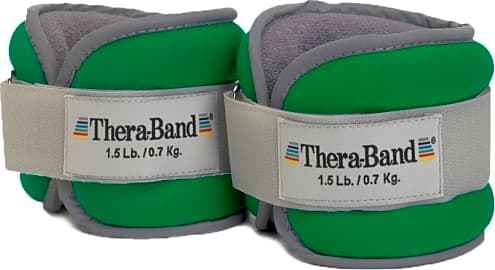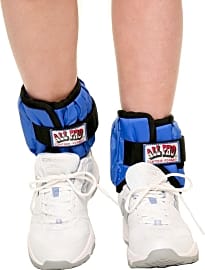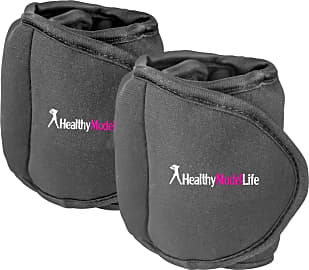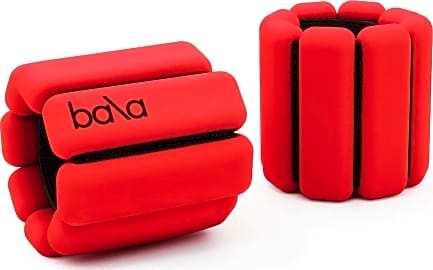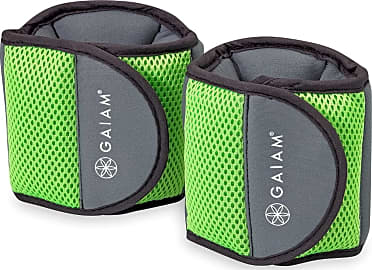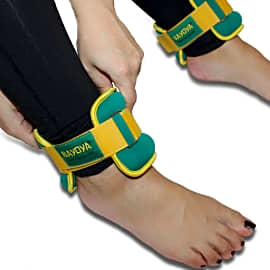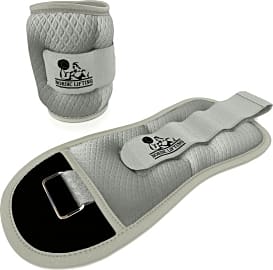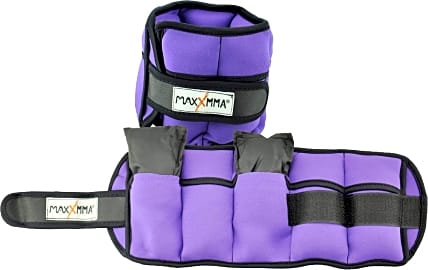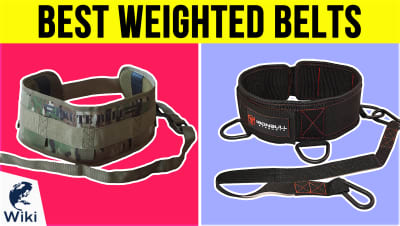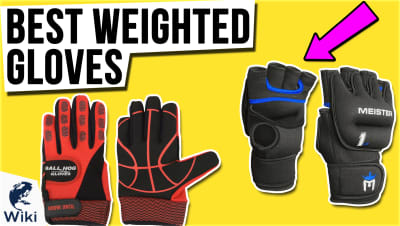The 10 Best Ankle Weights

This wiki has been updated 38 times since it was first published in July of 2015. Wearing a set of ankle weights as you go about your day can help you build muscle and burn calories without stepping into a fitness center or breaking into a jog. They're also a great way to add intensity to your workout routines. Available in a variety of weight combinations, they can serve as a nice complement to rehabilitation programs, as well, but be sure to consult your doctor first. When users buy our independently chosen editorial recommendations, we may earn commissions to help fund the Wiki.
Editor's Notes
May 17, 2021:
For the most part, we found that this list was still holding up well, and most of our picks from last year looked just as good this year. One notable exception was our bottom-ranked Da Vinci Pairs, which wasn’t available during this update, so we took the opportunity to replace it with an alternative that we think many of our users will find practical and stylish.
The Wulinjoin Exercise are a silicone pair that in many ways resemble the Bala Bangles, although they’re priced more affordably and available in two- and four-pound versions — compared to the Bangles that only come in two-pound pairs. They’re offered in four attractive colors, and they don’t absorb sweat, so they may require less maintenance — compared to neoprene options that should be hand washed regularly.
Ankle weights can be a great way to add a bit of resistance to a workout, but they aren’t the only way. For alternative approaches, check out our lists of weighted belts, weighted gloves and weighted vests.
March 20, 2020:
Before you begin a regimen with ankle weights, remember that adding weight to your daily walking can put a strain on your joints — so you may want to talk to your doctor, physical therapist, or trainer before you begin, especially if you have any pre-existing issues. You could also be at risk of causing muscle imbalances, so you'll need to consider when and how often you use such exercise equipment.
With that said, we still think that the TheraBand Comfort and the All Pro Adjustable provide excellent usability and comfort for the price, which is, admittedly, higher than some. These models, however, have plenty of cushioning to keep you comfortable, and they're made for the long haul (or stroll, as the case may be). It's also tough to top the Reehut Premium, which start at a 1 pound set and go all the way up to 10 pounds for users who already have a good base level of strength. Handily color coded, they have elongated straps that ensure they fit a wide range of users. This is in contrast to some, like the Healthy Model Life that run a bit small, and the Gaiam Fitness 5Lb., which tend to be big.
We've also opted to add the Bala Bangles at this time, an item some will remember from Shark Tank. They have a sleek, appealing design that looks something like a bangle bracelet, rather than most, including the MaxxMMA Neoprene and Nordic Lifting Adjustable, which look very much like a piece of workout gear. Plus, the Bala model comes in several stylish colors, in case you want to match them to your workout clothes or gym bag.
Special Honors
AquaBells Combo Set You might need to travel, but that doesn't mean you have to quit your workout routine. The AquaBells Combo Set features dumbbells and ankle weights that you fill with water, making them ultra portable and useful just about anywhere you go. You'll need to be careful not to get holes in the material, though. aquabells.com
P.volve Ultimate Package The P.volve Ultimate Package can help you reach your fitness goals through light resistance training thanks to a range of gear that includes exercise bands, hand weights, 1.5- and three-pound sets of ankle weights, and more. If you're stuck for ideas about how to use this equipment, the company offers a paid subscription platform that will get you started. pvolve.com
A Brief History Of Weight Training
At the first modern Olympics in 1896, competitive weightlifting was featured as part of the track and field competition.
The desire to prove to your peers that you're capable of lifting heavier things than they are is as old as humanity itself. In many ancient societies, tribes would have a giant rock, and whoever was able to lift the rock got to inscribe their name into the stone. It was basically the prehistoric equivalent of winning a t-shirt for eating a 5-pound burrito in an hour.
The ancient Greeks were the first to develop the idea of progressive resistance training. A famous wrestler from the 6th century B.C.E., Milo of Croton, was said to have carried a newborn calf on his back every day to slowly build up his strength until such time as he could carry around a full-grown cow.
While carrying cows around is certainly an impressive party trick (assuming you like to party on dairy farms), it's not really a practical training regimen. One of Milo's contemporaries, a physician named Galen, created primitive dumbbells that were much more practical for slowly and steadily building strength.
For most of the next few millennia, most people built strength through daily chores, and didn't feel the need to spend what little free time they had trying to add extra power to their frame.
By the 19th century C.E., however, improving your physique was becoming more of a priority. Barbells were invented, and the Indian club was extremely popular, especially in post-Civil War America.
At the first modern Olympics in 1896, competitive weightlifting was featured as part of the track and field competition. It became its own event about 20 years later, and boasting the world's reigning strongman became a point of national pride.
In the 1930s, Charles Atlas became a household name thanks to his early weight training routines, and especially due to a marketing strategy that linked being muscular with being masculine. For the first time, building your body was seen as a necessity rather than a novelty.
When the 1970s rolled around, Arnold Schwarzenegger helped put bodybuilding on the map. That, combined with more and more research demonstrating the health benefits of pumping iron, made strength training an important habit for men and women alike.
Today, it's almost universally-recognized that everyone should do a little bit of resistance training, and there are myriad ways to incorporate weights into your daily routine. You don't have to look like Arnold, but your body will thank you for adding some lifting into your life.
Just don't carve your name into the dumbbells at the gym. They hate that.
Benefits Of Ankle Weights
While slapping on a pair of ankle weights isn't enough to single-handedly transform your body, don't underestimate the impact these little things can have on your health and physique.
By adding constant, slight resistance to your legs, you can tone your butt and legs without adding much bulk. Any increase in muscle mass could also boost your metabolism, helping you burn more calories even when you're not actively trying to do so.
They make improving your body within the reach of just about anyone, regardless of financial situation.
You won't have to sacrifice a bunch of time or space to achieve these results, either. Because they're extremely small, you can stash them in a drawer or under your bed, and you won't have to be constantly tripping over a bulky piece of equipment. And, if you're wearing them all day, you can just go about your regular routine without having to carve out a dedicated time to get a workout in.
Even better, they're extremely inexpensive, so you won't have to shell out for a monthly gym membership or installment payments on a Bowflex. They make improving your body within the reach of just about anyone, regardless of financial situation.
They're especially good for the elderly, or those rehabbing from an injury, as they can provide steady resistance without taxing your muscles too much. There's a reason why so many physical therapists swear by these things.
Now, don't get us wrong — they're not a replacement for free weights and a dedicated fitness routine. However, they're a great way to dip your toe into your New Year's resolution, or to just add a little extra oomph to your daily life.
Which brings us to the biggest drawback these things have: they give you no excuse not to exercise.
Getting The Most Out Of Your Ankle Weights
Just because ankle weights aren't heavy doesn't mean they can't have a big impact on your body — if you use them correctly, that is. Luckily, we're here to show you how to do just that.
Of course, before we get started, we have to insert the obligatory "talk to your doctor before you begin" warning, especially if you're recovering from injury. You might not think it, but you can hurt yourself if you're not careful.
This is surprisingly taxing, and works everything from your core on down.
You should primarily use ankle weights to augment bodyweight exercises. If you do squats or pistols, incorporate a leg lift at the end. This is surprisingly taxing, and works everything from your core on down.
Speaking of your core, adding extra weight to Supermans or hanging leg raises can build up those abs like you wouldn't believe. In fact, you should wear ankle weights anytime you do anything on a chin-up bar.
Of course, you don't have to do any exercises at all to benefit from ankle weights. You can wear them while walking your dogs or doing your grocery shopping, and your tired legs at the end of the day will inform you of just how much of a workout you managed to get in without even realizing it.
Really, there aren't any wrong ways to use them — just be sure you use them. Because if all they ever do is sit in the corner, then the only thing they'll build is your guilt muscle (and it's probably swole enough).



